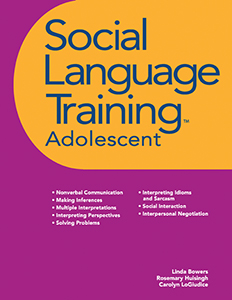Description

Ages: 12-18
Grades: 7 through adult
Students with hearing loss all too often have deficits in how appropriately they communicate with others. It is typical for them to have pragmatic language delays that impact social interactions, sometimes in a subtle manner. Here is a developmental, evidence-based program for social language skills. This program is based on the results of the Social Language Development Test Adolescent, research, and practical experience. Students learn to recognize, understand, and successfully deal with positive and negative social situations. Units of the book are arranged in order of general skill complexity and development. Students focus on specific social language skills while using the activity sheets for discussion; sharing related personal experiences; and scripting, if necessary. Scene illustrations segue into role-playing. The need for writing is minimal.Specific skills addressed include:Nonverbal Communication
-
-
- identify and interpret facial expressions, gestures, posture, proximity, and wordless vocalizations (hmmm, ah-ha, duh, etc.) in isolation and together
-
Making inferences:
-
-
- pay attention to relevant details and ignore irrelevant ones
- use context, body language, and other clues to make reasonable inferences about what is happening and why
-
Problem solving
-
-
- recognize the feelings of others as a priority when solving problems
- thinking of solutions that preserve and/or create friendships
-
Multiple interpretations
-
-
- think of more than one logical interpretation for a situation
- develop flexibility in thinking and consider the logical possibilities
-
Social Interaction
-
-
- learn to pay attention to body language, facial expressions, vocal intonation (when possible), and the expressive language of their peers, acquaintances, family members, strangers, and authority figures
- learn to recognize appropriate and inappropriate reactions to these people and what to say and do
- handle difficult social situations appropriately
- support friends and preserve friendships
-
Interpreting Perspectives
-
-
- Understand the key factors in evaluating others’ perspectives
- recognize that people in the same situation can think different thoughts and have different opinions
-
Interpreting Idioms and Sarcasm
-
-
- learn to recognize the paralinguistic features of conversations that are replete with innuendo, sarcasm, and metaphors in order to react appropriately in social situations
-
Interpersonal Negotiations
-
-
- learn to compromise, acquiesce, problem solve, listen, seek mutual resolutions, and negotiate
-
To see more of this product’s contents:
184 pages • 8.5 x 11, softcover • ©2010
Supporting Success is happy to offer this product from ProEd/Linguasystems Publications.
Related Teacher Tools Takeout Items
Related Products
No products found

